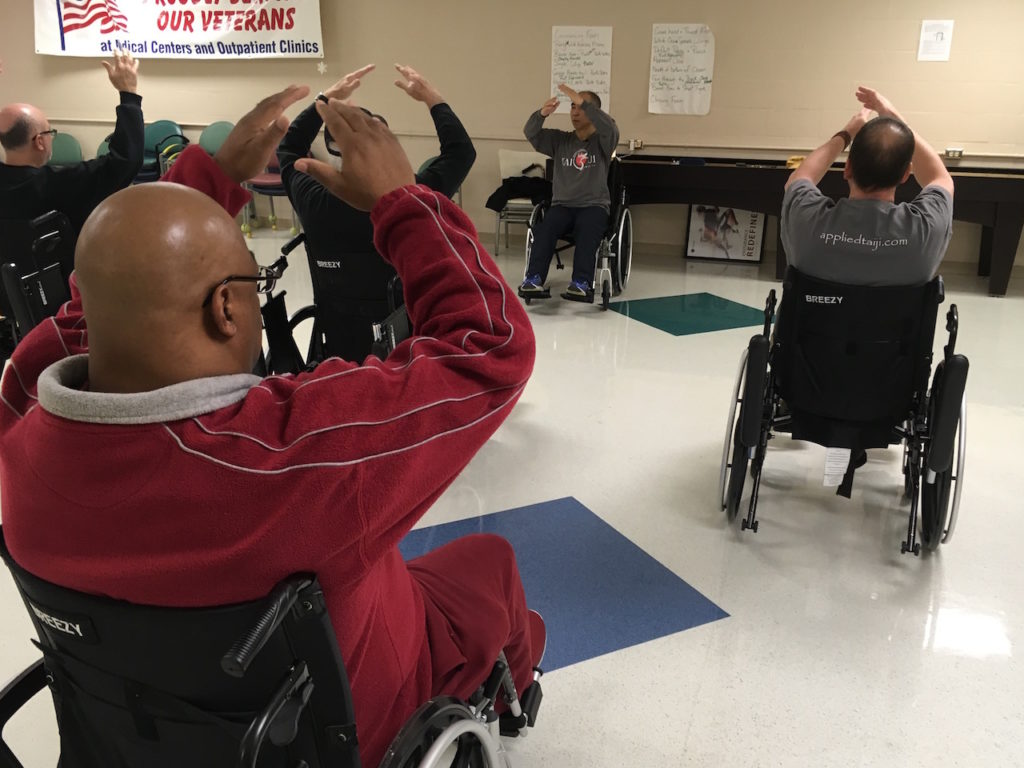
The U.S. Department of Veterans Affairs has been desperate to cut down on the use of powerful pills. So the mammoth agency has taken a sharp turn toward alternative medicine. The thinking goes that even if it doesn’t cure a mental or physical ill, it can’t hurt.
In Tennessee, treatment for veterans is beginning to include the ancient martial art of tai chi. Zibin Guo leads a weekly session at the Alvin C. York VA hospital in Murfreesboro. He guides vets through slow-motion poses as a Bluetooth speaker blares a classic tai chi soundtrack.
“Cloudy hands to the right, cloudy hands to the left,” he tells the veterans, seated in wheelchairs. “Now we’re going to open your arms, grab the wheels and 180-degree turn.”
The participants swivel about-face and continue to the next pose.
Guo modified tai chi to work from a seated position, though many of the participants are not wheelchair-bound. Even for those who can walk, the wheelchair makes it easier to get through a half-hour of movement.
The VA has blessed this project with nearly $120,000 in grant money for adaptive sports. Guo started in Chattanooga and expanded to Murfreesboro. Now he’s moving on to a half dozen VA hospitals in Florida, Texas, Utah and Arizona. Guo believes the focus on breathing and mindfulness — paired with manageable physical activity — could benefit a variety of ailments.
“When you have a good amount of body harmony, people tend to engage in proactive life. So that helps with all kinds of symptoms,” he says.

While wheelchair tai chi would provide activity for those who’ve lost some use of their legs, physical ailments are not the primary target. It’s the multitude of vets with conditions like post-traumatic stress disorder.
“Night before last, when we had the thunderstorm. The thunder is a big trigger for some people,” Thomas Sales of Hermitage says, recalling his most recent panic attack.
The urge to take cover caught him by surprise, especially since it’s been more than 25 years since he was in combat with the Navy Special Warfare Command.
“You’ll find yourself flashing back to being out there with the fellas, and you’ll just kind of snap,” he says. “And I found myself, for some reason, thinking about doing the breathing techniques [from tai chi] and doing the heaven and earth and then breathing deep and slow.”
Sales says he knows it must look “crazy” when he reaches to the sky and then sweeps his arms to the ground because there was a time that he thought tai chi looked sort of crazy, too. Most of these patients had some skepticism going in. But Vietnam veteran Jim Berry of Spring Hill says he’s convinced.
“My daughter sent me a t-shirt that sums it up,” he says. “Tai chi is more than old folks chasing trees,” referencing the masses of elderly people who gather at parks in China.
The former Marine admits that he used to notice groups in the park, moving in unison. “I failed to see the point,” he says. But he credits the practice with helping him quit smoking. “No cigarettes for three months now.”
For Zarita Croney — a veteran with the National Guard — tai chi has also helped with chemical dependence.
“My whole life revolved around, ‘oh shoot, when can I take my next pill?'” she recalls.
She now makes the nearly-two-hour drive from Hopkinsville, Kentucky, to Murfreesboro each week, and she says she’s cut down on her use of opioids for pain.
“Everyone is here because they decided, ‘I want to try something that isn’t just putting a pill in my hand.'”
This idea of going beyond prescriptions has been a key focus of the VA, especially for high-powered painkillers. In Tennessee,
nearly a quarter of all VA patients with an active prescription were on opioids in 2012. That number is down to 15 percent, but still higher than most of the country.
The
VA acknowledges that there’s very little proof that tai chi — or other alternative treatments like mindfulness and acupuncture — will do any good for PTSD or addiction, though there has been research into the benefits of tai chi
related to quality of life among the elderly. Still, Aaron Grobengieser, who oversees alternative medicine in Murfreesboro, says the VA will attempt to track the effectiveness by the numbers.
“Whole health, along with how many opiates are being prescribed, we’re going to look at how does this impact that,” he says. “We have the baseline. Does this reduce that baseline?”
Grobengieser says tai chi — alone — isn’t going to be the cure. But for many, it may help. And he hopes it will slowly evolve how the VA is viewed — from a place to turn in crisis, to a weekly part of a veteran’s lifestyle.


